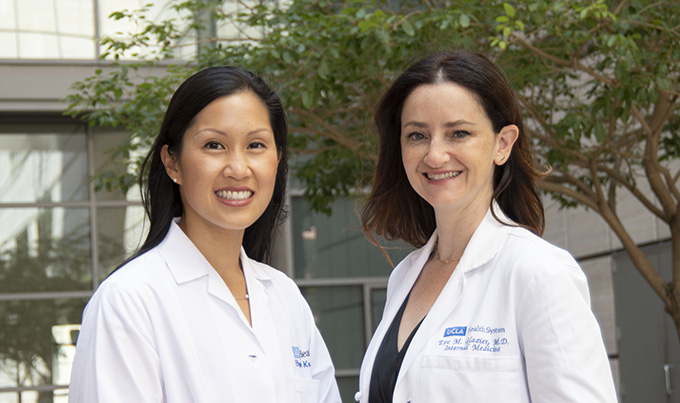(Ask the Doctors) Exercise can improve cognition in older adults
Published 8:30 pm Wednesday, July 30, 2025

- Eve Glazier, M.D., MBA, is an internist and associate professor of medicine at UCLA Health. Elizabeth Ko, M.D., is an internist and assistant professor of medicine at UCLA Health. Send your questions to askthedoctors@mednet.ucla.edu.
Dear Doctors: I am 82 years old, and I have tested negative for Alzheimer’s disease. But I do have some cognitive dysfunction. Can this be slowed? I exercise 30 minutes a day. In addition to that, I walk at least 1 mile. I also bicycle vigorously for two six-minute periods a day. Do you think this is helping?
Dear Reader: Changes to cognitive function are a natural part of aging. Unlike the severe or rapid decline that signals dementia, age-related changes tend to be gradual and subtle. Minor forgetfulness is common, such as where you left your keys or a specific word you can’t recall. Executive function slows; you may find multistep tasks harder. Physical reaction time often slows down, too. This affects your ability to react and adjust to sudden changes or stimuli. Paying attention to a task or event may also feel more difficult.
Research shows that being physically active can help maintain and improve cognition in older adults. This includes aerobic exercise, strength training and stretching. The exercise you describe, including walking and biking, fits this goal. According to recent research, resistance training, which includes lifting heavy weights, is also good for cognitive health in older adults. It’s important for anyone pursuing this form of exercise, no matter their age, to do it safely. Use proper form and have a spotter when lifting heavier weights. It’s always wise to discuss starting a new exercise regimen with your doctor.
Trending
Physical exercise is only one part of the equation. Mental exercise is just as helpful. Look for activities that involve learning, concentration and memory; reading, drawing, craft projects, building, knitting, birdwatching, crosswords, puzzles and board games are great options. Each of these work various “muscles” in your brain. Whatever you choose should also be fun. You’re more likely to continue an activity that brings you joy.
Social engagement also plays a vital role in memory. As people age, they can become isolated. Research shows that friendships and interaction protect and improve cognition as well. Senior and community centers usually offer low-cost or free activities. Volunteering is another path to socializing. Many older adults have skills or interests that benefit their communities.
Eating a healthful diet is also key. Fresh vegetables and fruit, legumes, grains, nuts, lean proteins and fatty fish fuel your brain and body well. Ample evidence shows a diet high in added sugars and ultra-processed foods can take a toll on cognitive health. Smoking and alcohol also have an adverse effect.
Remember to keep up with recommended screenings and continue partnering with your medical care provider on these and other ways to protect your cognitive health.
Hello, readers: You are keeping our inboxes busy, so we’ll dive right in.
— We recently wrote about collagen peptides, a protein abundant in collagen, skin and bone. It is available as a nutritional supplement, which is the subject of one reader’s question: “I have read that collagen supplements can increase bone mineral density, and have even had a doctor suggest that I use them,” she wrote. “Is there any evidence to support this?”
Trending
Bone health is an important concern for women who have gone through menopause. Estrogen plays a key role in maintaining bone health. A decline in estrogen during menopause can lead to a net loss of bone mineral density. Several small studies found that, after a year of daily collagen peptides supplementation, some women measurably increased bone mineral density in the lower spine and upper leg. They also had higher levels of a blood biomarker that indicates bone formation. The results were affirmed in a follow-up study. As we noted in that column, these were small studies, so further research is needed. However when used as recommended on the product packaging, collagen peptide supplements are generally well-tolerated. It may be helpful to follow your doctor’s recommendation.
— We’ve written about the challenges of long COVID, a collection of symptoms that can persist after an initial COVID-19 infection resolves. These include brain fog, loss of taste or smell, heart arrhythmia, extreme fatigue, shortness of breath, dizziness, digestive issues, poor sleep and depression. We continue to hear from people struggling with the debilitating effects of this condition, including a reader from Washington. “I was skeptical of claims about long COVID until I contracted COVID-19 for the third time. Since then, I have had almost daily incidents of debilitating fatigue that can last hours,” he wrote. “Can you share more information about the trials you described in your newspaper column so that my primary care physician and I can see if I might be a good candidate to join one of them?”
Long COVID continues to be a serious problem, with an estimated 20 million people in the United States struggling to recover. You and your physician can learn about clinical trials currently recruiting patients at clinicaltrials.gov. Search “long COVID” and look for studies that are still recruiting. Your doctor may also find it useful to read the capsule descriptions of the ongoing studies, which shed light on the various approaches and treatments now being considered.
Eve Glazier, M.D., MBA, is an internist and associate professor of medicine at UCLA Health. Elizabeth Ko, M.D., is an internist and assistant professor of medicine at UCLA Health.





